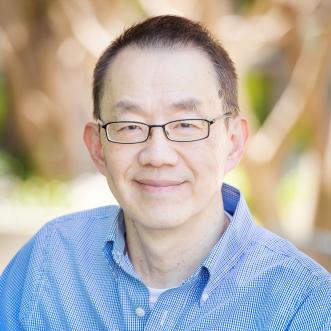




A physician and a scientist, Morgan Sheng is author of more than 200 peer-reviewed publications focused on the molecular cellular biology of synapses and synaptic plasticity, and pathogenic mechanisms of neurodegenerative diseases. Sheng’s molecular studies of the structure and function of synapses (the communication junctions between brain cells) while at MGH and MIT have enhanced our understanding of the neural basis of cognitive function and dysfunction, including learning and memory, neurodevelopmental disorders, and dementia. His work has uncovered the form and complexity of protein complexes in the postsynaptic membrane that regulate the remarkable plasticity of neuronal connections.
At Genentech he built and led a world-class neuroscience department and research program focused on elucidating pathologic mechanisms and developing new treatments for neurodegenerative diseases and pain, and illuminating pathways that are of basic scientific interest as well as therapeutic relevance. Sheng and coworkers made important discoveries regarding the molecular mechanisms of synapse weakening and loss, the contributions of microglia and innate immunity in neurodegenerative diseases, and the roles of genetic risk factors in the pathogenesis of Alzheimer’s disease, Parkinson’s disease, ALS, and frontotemporal dementia.
As Co-Director of the Stanley Center for Psychiatric Research at the Broad Institute, Sheng will help to shape the center’s scientific vision and direction, and oversee the center’s efforts to develop therapeutics for schizophrenia and other serious mental illnesses.
Morgan Sheng is a Core Institute Member of the Broad Institute of MIT and Harvard, where he serves as Co-Director of the Broad’s Stanley Center for Psychiatric Research. He is also a Professor in MIT’s Department of Brain and Cognitive Sciences, an affiliate member of The Picower Institute for Learning and Memory, and a member of the Board of the McGovern Institute for Brain Research.
From 2001 to 2008, Sheng was the Menicon Professor of Neuroscience at MIT, as well as an investigator of the Howard Hughes Medical Institute. From 2008 to 2019, Sheng was vice-president of neuroscience at Genentech, a leading biotech company, where he led research and drug discovery efforts for major diseases of the nervous system. His research at Genentech focused on pathogenic mechanisms of neurodegenerative disease, particularly Alzheimer and Parkinson disease. The goals of Sheng’s current research at the Broad are to understand the neurobiological mechanisms of schizophrenia and bipolar disorder, and to develop new therapeutics to treat patients suffering from these psychiatric illnesses.
Sheng is a Fellow of the Royal Society (UK), Fellow of the Academy of Medical Sciences (UK), Member of the National Academy of Medicine (USA), Fellow of the American Association for the Advancement of Science (USA), and honorary fellow of Corpus Christi College, Oxford (UK). He has served on the editorial boards of Neuron, Journal of Neuroscience, and Current Opinions in Neurobiology. A recipient of the Young Investigator Award and the Julius Axelrod Prize of the Society for Neuroscience, and the Foundation Ipsen Prize in Neuronal Plasticity, Sheng is author of more than 200 peer-reviewed publications focused on the structure and plasticity of synapses and the mechanisms of brain diseases (neurodegenerative and neuropsychiatric).
Sheng received a B.A. (1st class honors) from Oxford University and obtained his medical degree and training at London University. His Ph.D. thesis was completed at Harvard Medical School in the lab of Michael Greenberg. Following postdoctoral research in the lab of Lily Jan at the University of California, San Francisco, Sheng was a faculty member and HHMI investigator in the Department of Neurobiology at Massachusetts General Hospital and Harvard Medical School before joining MIT.
John Adeleye (Research Associate I)
Sameer Aryal, Ph.D (Research Scientist I)
Harry Burke (Computational Associate II)
Margery Chen, (Research Associate I)
Niki Chen, (Research Associate I)
Gabi Drummond (Postdoctoral Associate)
Zohreh Farsi, Ph.D. (Group leader, Research Scientist I)
Himanshu Gangal, Ph.D. (Postdoctoral Associate)
Yang Ge, Ph.D. (Postdoctoral Fellow)
Ana Geller (Research Associate I)
Alyssa Hall (Research Associate II)
Wei-Chao Huang, Ph.D. (Postdoctoral Associate)
Kyla Jacobs (Research Associate I)
Prabhat Kunwar, Ph.D. (Senior Group Leader, Research Scientist)
Min Jee Kwon, Ph.D. (Research Scientist I)
Xiaoman Liu, Ph.D. (Research Scientist I)
Deeksha Misri (Computational Associate II)
Tamar Paserman (Research Associate I)
Santosh Pothula, Ph.D. (Research Scientist II)
Horia Pribiag, Ph.D. (Research Scientist II)
Bryan Song, Ph.D. (Research Scientist I)
Margaret Yin, (Research Associate I)
Kira Brenner
Diana Bohannon, Ph.D.
Borislav Dejanovic
Chuhan Geng
David Graykowski
Linnea Herzog
Kira Perzel Mandell, Ph.D.
Sahana Natarajan
Ally Nicolella
Ines Picard
Nate Shepard
Sarah Wade